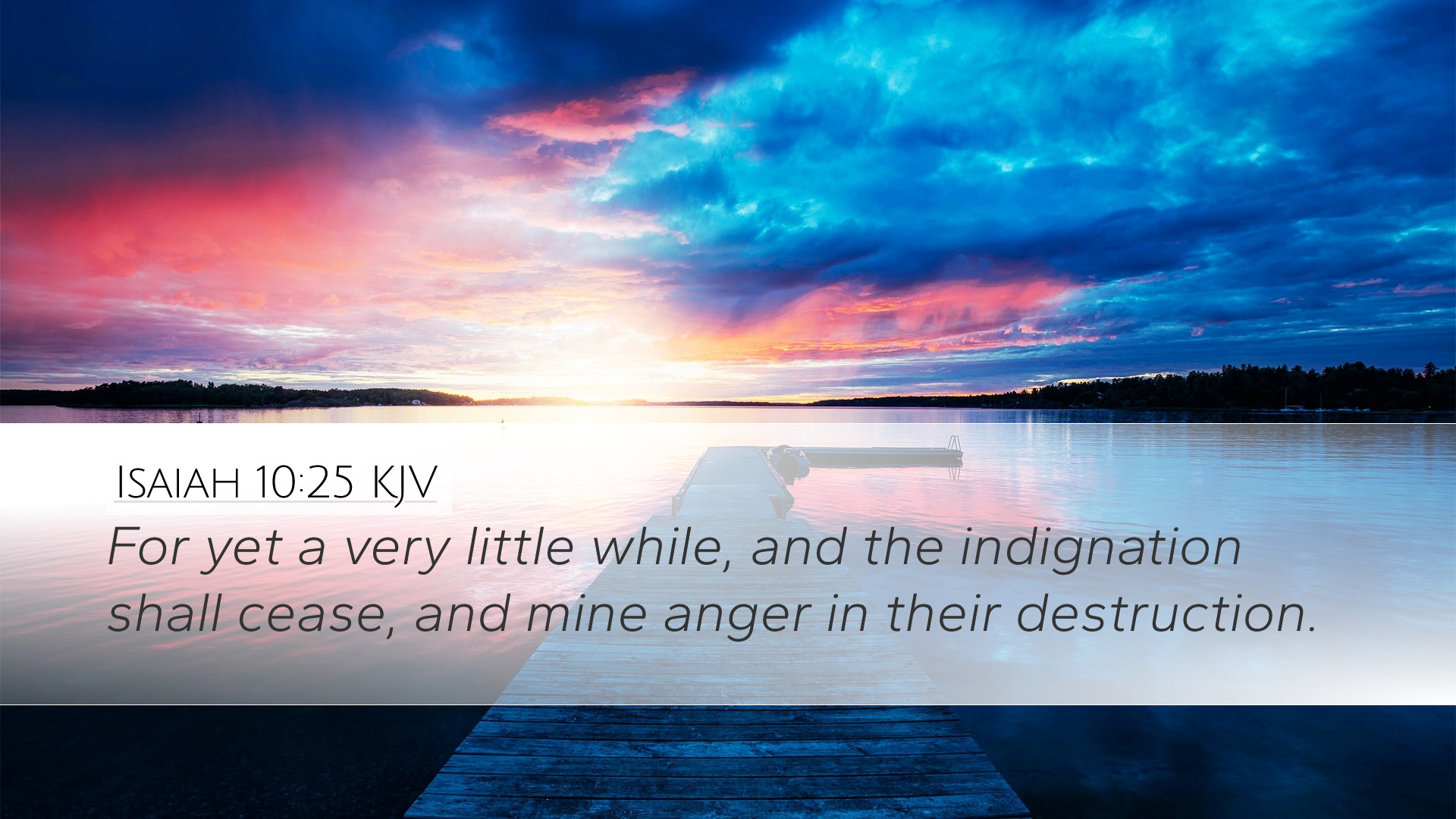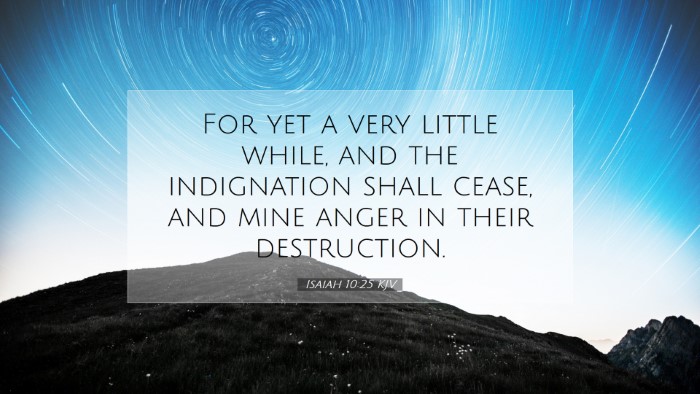Bible Commentary on Isaiah 10:25
Isaiah 10:25 states, "For yet a very little while, and the indignation shall cease, and mine anger in their destruction."
This verse occurs in a context where God is promising relief for His people following severe judgments executed through instruments of His wrath. Each commentary provides theological insights into the nature of God's discipline and the hope of eventual restoration.
Contextual Analysis
In the preceding chapters, particularly Isaiah 10, God addresses the oppression by Assyria, illustrating His sovereignty in using even pagan nations as tools of His judgment against Israel. The Assyrians have executed their conquests with brutality, believing themselves to be invincible. However, God reminds them that their power is limited and that His ultimate purpose is redemptive.
Matthew Henry's Commentary
Henry emphasizes the temporary nature of God's anger. He explains that the phrase "a very little while" refers not only to the duration of God's chastening but also signifies a future hope for Israel. Henry writes that God’s indignation is a consequence of sin but is not perpetual; rather, it is aimed at correction.
Furthermore, Henry interprets "the destruction" as pointing to the downfall of oppressors as well as a prelude to Israel’s restoration. The promise that God’s anger will cease gives believers an anchor for their faith, indicating that divine wrath is not the end but a means to achieve spiritual renewal.
Albert Barnes' Notes on the Bible
Barnes aligns with the notion of temporality underlying God’s discipline, suggesting that the verse illustrates God’s long-term design for His people. He notes that the use of "indignation" connotes a passionate response from God against injustice, yet emphasizes that it is not without purpose.
He elaborates that this short period of anger leading to destruction ultimately serves as a means to salvation and a return to favor. Barnes insists that the assurance in this verse extends beyond Israel to all who suffer under divine discipline, encouraging them to persevere with hope and faith.
Adam Clarke's Commentary
Clarke presents an in-depth exploration of the imagery in this passage. He highlights that the phrase "indignation shall cease" reflects a divine promise that precedes heartfelt repentance. Clarke elucidates that God’s disciplinary measures, however harsh they may appear, are deeply rooted in love and aimed at the ultimate spiritual benefit of His people.
He notes that both the terms "cease" and "destruction" indicate a contrast between judgment and mercy. Clarke emphasizes the strength of God’s faithfulness in returning to a right relationship with His people, assuring them that even in their darkest hours, they are surrounded by divine mercy and grace.
Theological Implications
The theological reflection on Isaiah 10:25 reveals several key insights valuable for pastors, students, theologians, and biblical scholars:
- The Justice of God: God's wrath is portrayed as just, serving to address evil and uproot sin.
- The Nature of Divine Discipline: God's chastisement is educational and redemptive, highlighting His paternal relationship with His people.
- The Covenant Relationship: The verse underscores God's faithfulness, which endures through trials.
- Hope for Restoration: Reflecting on future hope brings comfort, encouraging enduring faith amidst difficulties.
Practical Applications
Believers today can derive significant encouragement from this verse:
- Understanding that temporary trials have a purpose can help believers endure seasons of suffering.
- This encourages a perspective shift, allowing for viewing challenges as pathways to deeper faith rather than just punishment.
- Pastoral leaders can remind their congregations about God's faithfulness and the assurance of eventual deliverance.
Conclusion
In summary, Isaiah 10:25 serves as a profound reminder of the intricate nature of God's relationship with His people, embodying both judgment and mercy. The comments by Matthew Henry, Albert Barnes, and Adam Clarke collectively affirm that while God may be angered by sin, He is equally committed to the restoration and well-being of His people. The promise that His indignation shall cease is a cornerstone of hope for believers, reinforcing the unshakable truth that God’s ultimate intent is love and reconciliation.


